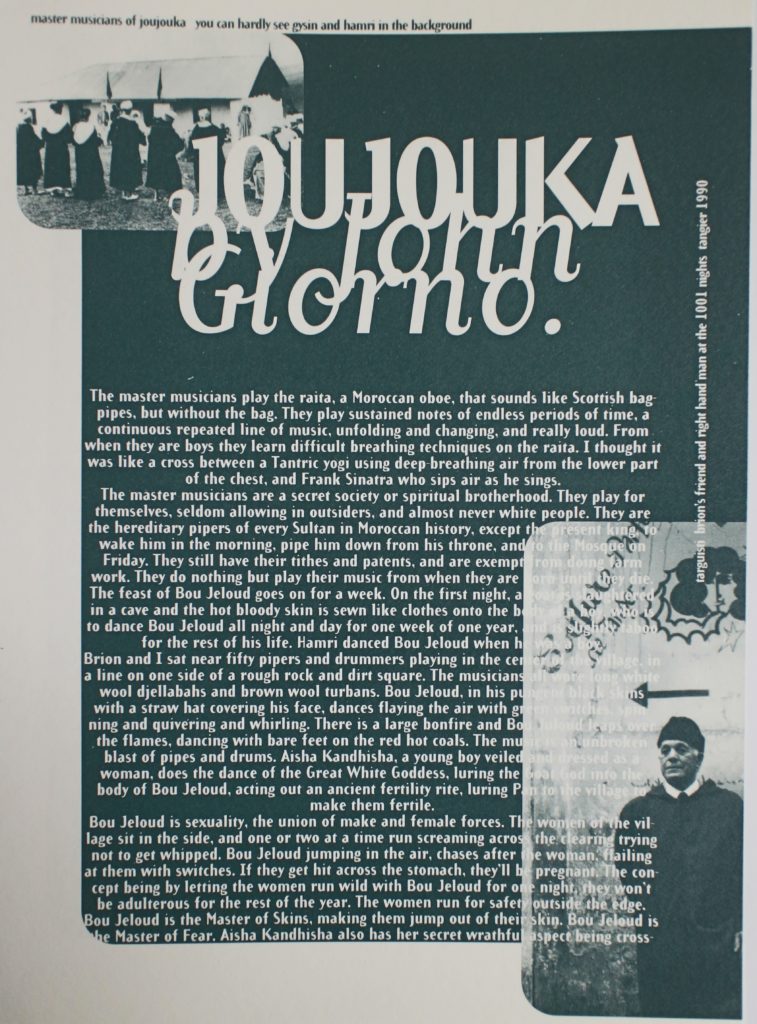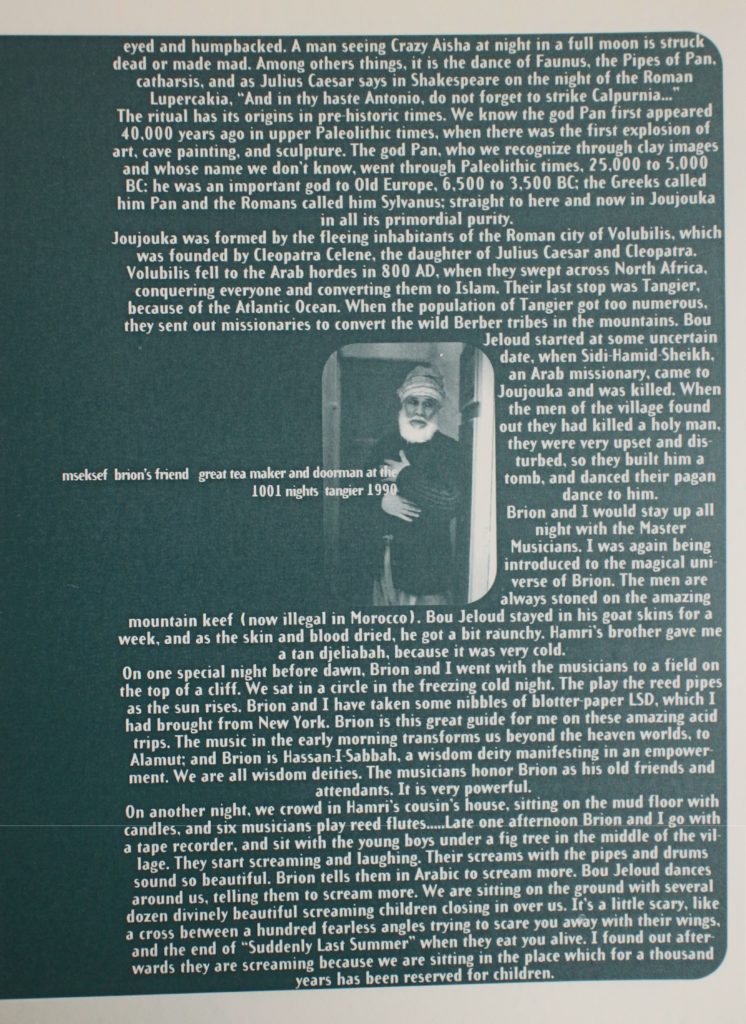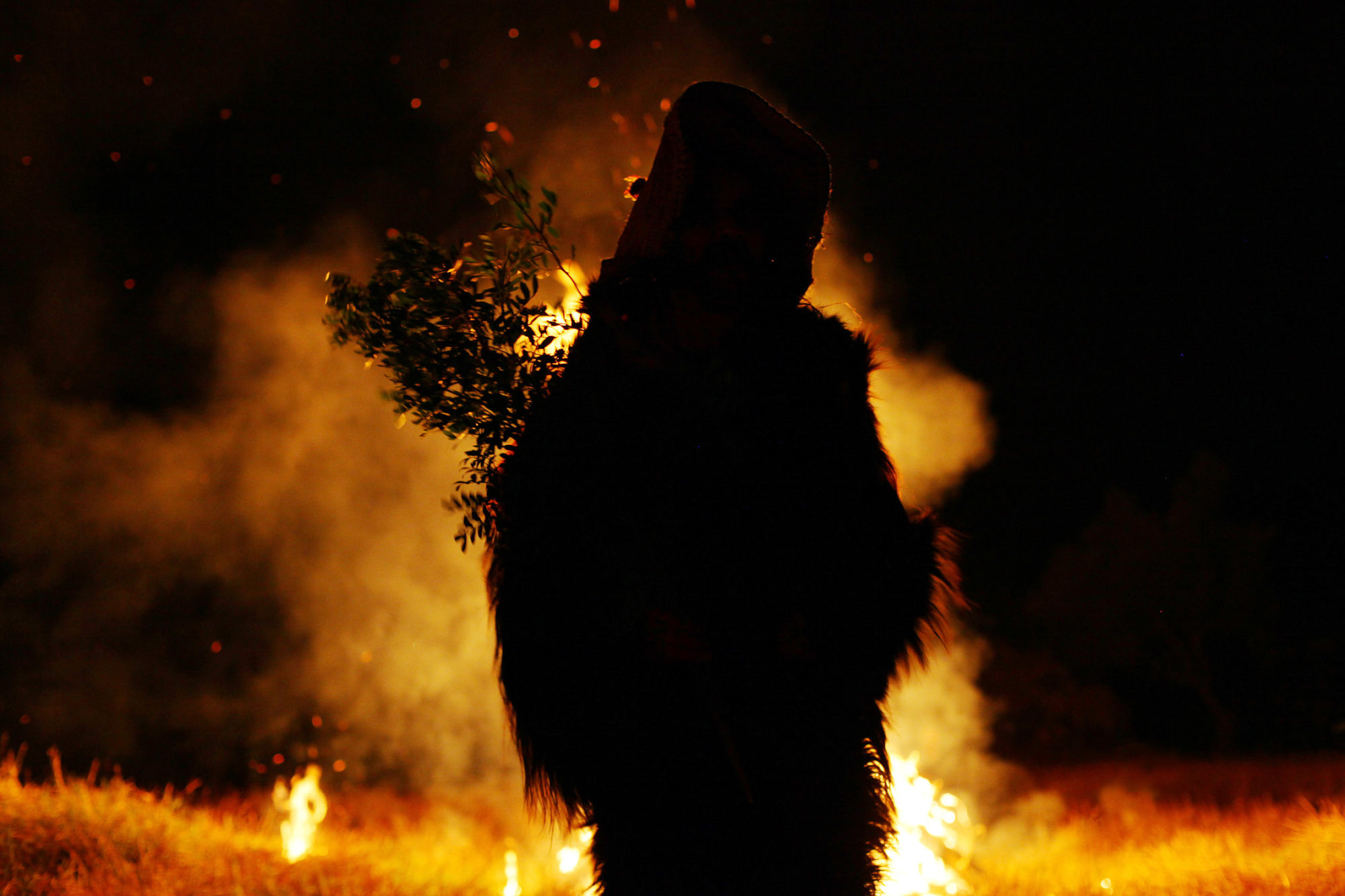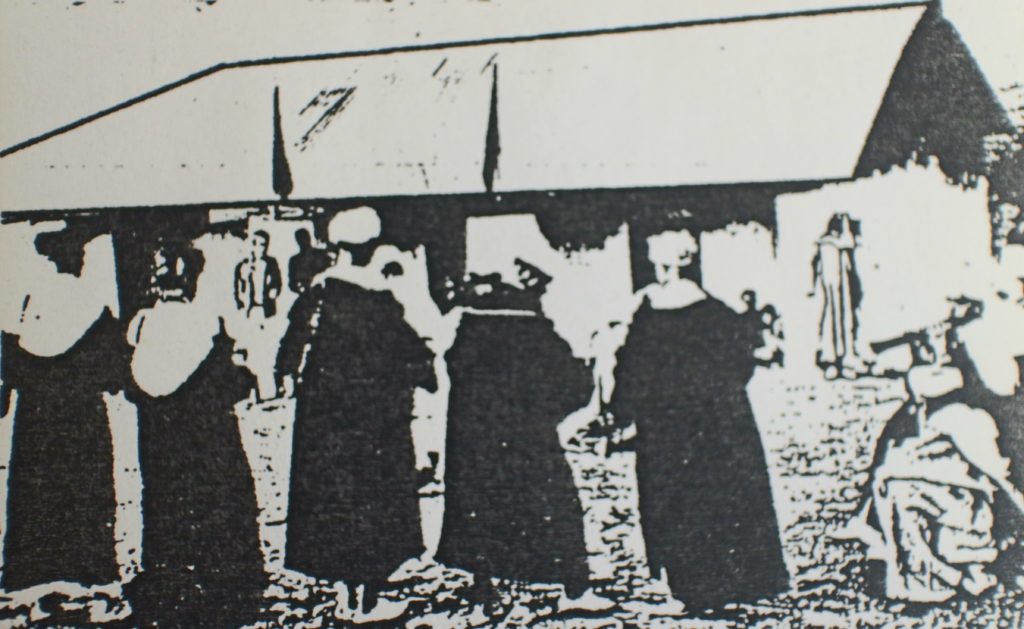
The Master Musicians of Joujouka, with Brion Gysin and Mohamed Hamri in the background photo by John Giorno (from ‘Jajouka’ cassette released by Transmitter)
Artist, poet and activist for LGBTQ+ rights John Giorno has died, aged 82.
Giorno visited Joujouka and spent time with the Master Musicians of Joujouka in the 1960s.
Born in New York City in 1936, John Giorno was an American poet and performance artist.
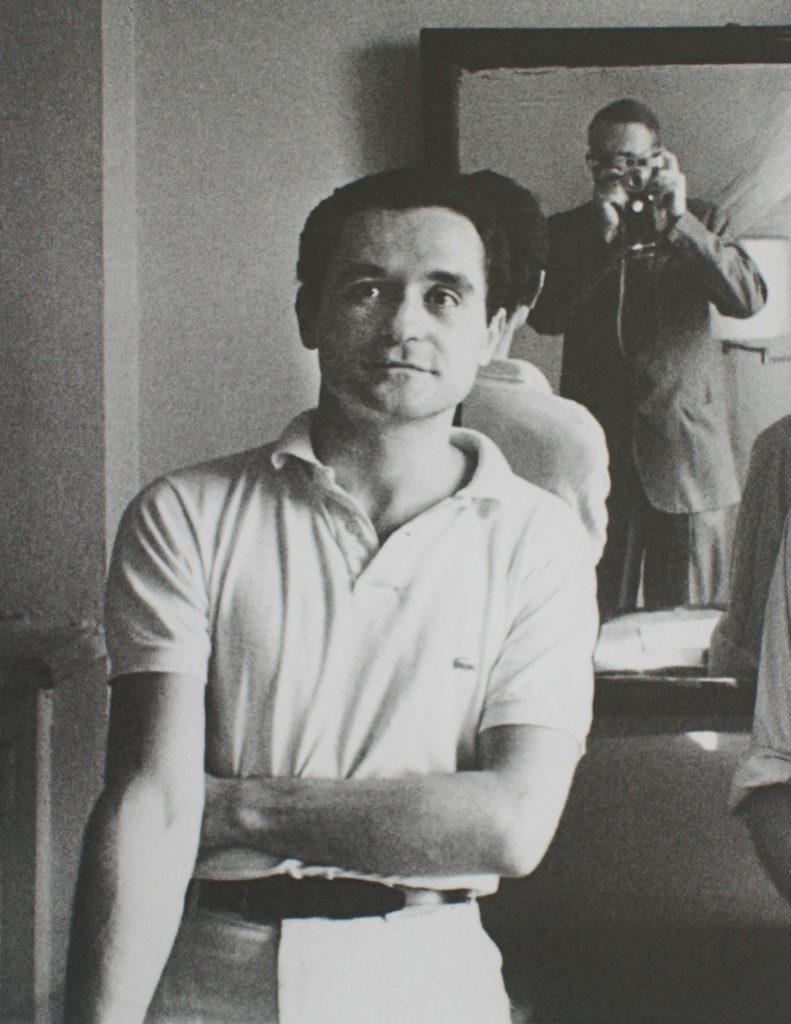
John Giorno by Willam S. Burroughs (from Taking Shots: The Photography of William S. Burroughs by Patricia Allmer and John Sears, 2009, Prestel)
Having appeared in Andy Warhol film Sleep in 1963, Giorno went on to found the not-for-profit production company Giorno Poetry Systems and masterminded a number of original multimedia poetry experiments and events, including Dial-A-Poem.
Giorno met William S. Burroughs and Brion Gysin in 1964 and spent time with Gysin in Morocco in 1966 when they visited Joujouka.
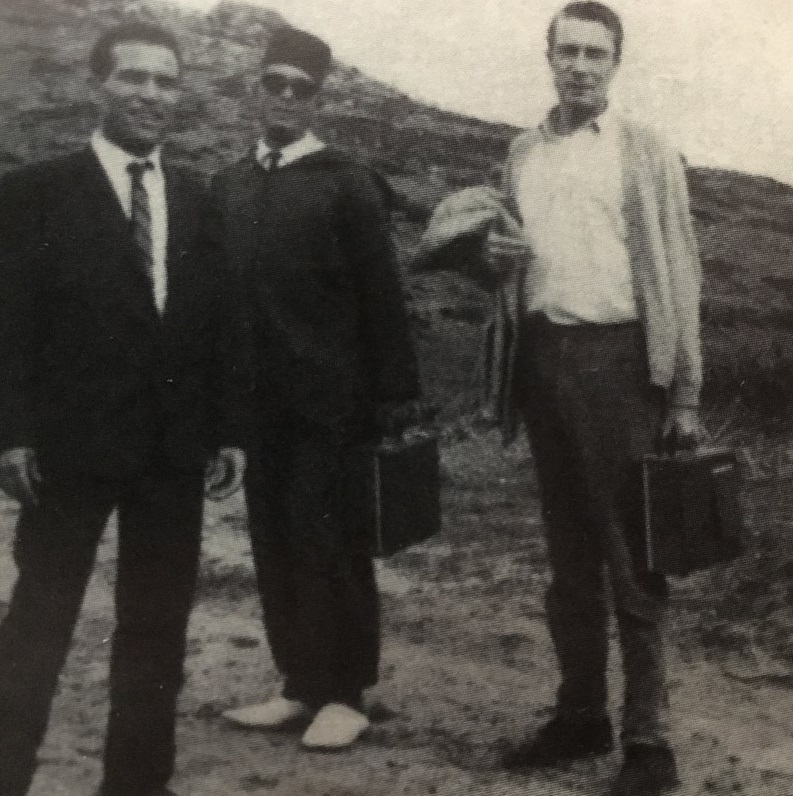
John Giorno photo of Mohamed Hamri (left), Brion Gysin (right) and Gysin’s major domo Targusti (centre) on the road to Joujouka in 1966 with UHER tape recorders in 1966 (courtesy of Joep Bremmers)
“In 1966, I lived with Brion in Tangiers for six months, and he showed me the music and magical powers of Morocco. Then for the rest of my life, I remained devoted to Brion.”
From The Great Demon King by John Giorno, from Brion Gysion: Tuning In To The Multimedia Age, edited by José Férez Kuri (2003, Thames & Hudson Ltd)
Giorno wrote about his experiences seeing the Master Musicians of Joujouka in Man From Nowhere: Storming the Citadels of Enlightenment with William Burroughs and Brion Gysin by Joe Ambrose, Terry Wilson, Frank Rynne (1992, Subliminal Books)
The Master Musicians of Joujouka and John Giorno met again at the Poetica festival organised by Festimad in Madrid in 1996. Master Musicians of Joujouka Manager Frank Rynne, Mohamed Hamri and drummer El Khalil Radi appeared at the festival also featuring Lydia Lunch, Richard Hell, Tav Falco and John Cale.
Speaking at the event, Giorno, reported in El País, said: “Poetry is experiencing a renaissance. I have been living as a poet for 35 years and I have seen how in recent years young people claim it again as their language. I think it is because poetry has always been on the sidelines of the market, unlike the novel or other arts.”
Frank Rynne said: “I met John at Festimad Poetica in 1996. It was the first time that he and Hamri had met in years. John entered the room where we were to have dinner and I said to Hamri, “That’s John Giorno,” and he ran to him and they embraced in tears. It was very moving to see them both reunited. John was always a super cooperative man and a great presence. May he rest in peace.”
Giorno died on 11 October 2019, aged 82. He is survived by his partner Ugo Rondinone.
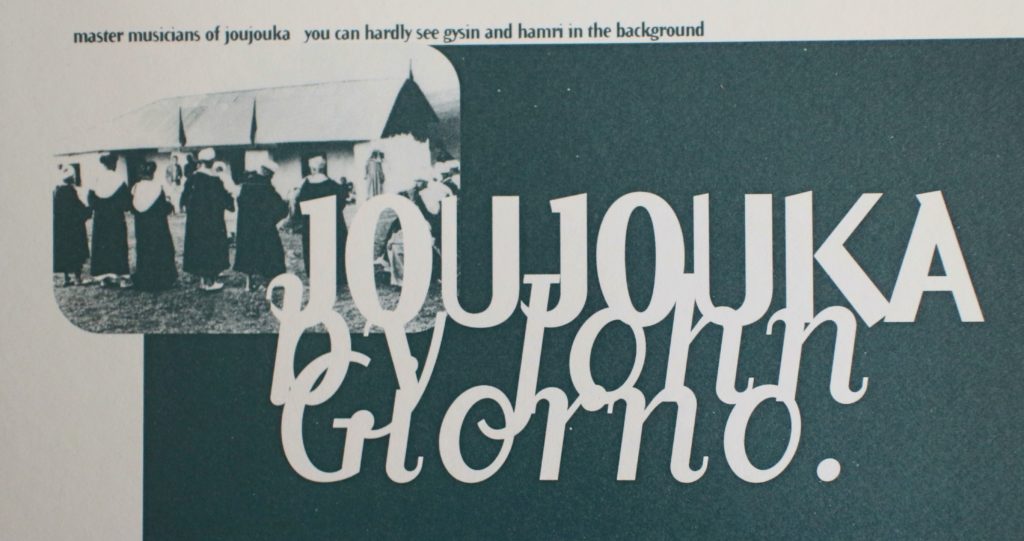
Joujouka by John Giorno, from Man From Nowhere: Storming the Citadels of Enlightenment with William Burroughs and Brion Gysin
The following text by John Giorno documented his experiences with the Master Musicians of Joujouka and Brion Gysin. Extract from Man From Nowhere: Storming the Citadels of Enlightenment with William Burroughs and Brion Gysin by Joe Ambrose, Terry Wilson, Frank Rynne (1992, Subliminal Books)
Joujouka by John Giorno
The master musicians play the raita, a Moroccan oboe, that sounds like Scottish bagpipes, but without the bag. They play sustained notes of endless periods of time, a continuous repeated line of music, unfolding and changing, and really loud. From when they are boys they learn difficult breathing techniques on the raita. I thought it was like a cross between a Tantric yogi using deep breathing air from the lower part of the chest, and Frank Sinatra who sips air as he sings.
The master musicians are a secret society or spiritual brotherhood. They play for themselves, seldom allowing in outsiders, and almost never white people. They are the hereditary pipers of every Sultan in Moroccan history, except the present king, to wake him in the morning, pipe him down from his throne, and to the Mosque on Friday. They still have their tithes and patents, and are excempt from doing farm work. They do nothing but play their music from when they are born until they die. The feast of Bou Jeloud goes on for a week. On the first night, a goat is slaughtered in a cave and the hot bloody skin is sewn like clothes onto the body of a boy, who is to dance Bou Jeloud all night and day for one week of one year, and is slightly taboo for the rest of life. Hamri danced Bou Jeloud when he was a boy.
Brion and I sat near fifty pipers and drummers playing in the center of the village, in a line on one side of a rough rock and dirt square. The musicians all wore long white wool djellabahs and brown wool turbans. Bou Jeloud, in his pungent black skins with a straw hat covering his face, dances flaying the air with green switches, spinning and quivering and whirling. There is a large bonfire and Bou Jeloud leaps over the flames, dancing with bare feet on the red hot coals. The music is an unbroken blast of pipes and drums, Aisha Kandisha, a young boy veiled and dressed as a woman, does the dance of the Great White Goddess, luring the Goat God into the body of Bou Jeloud, acting out an ancient fertility rite, luring Pan to the village to make them fertile.
Bou Jeloud is sexuality, the union of male and female forces. The women of the village sit in the side, and one or two at a time run screaming across the clearing trying not to get whipped. Bou Jeloud jumping in the air, chases after the women, flailing at them with switches. If they get hit across the stomach, they’ll be pregnant. The concept being by letting the women run wild with Bou Jeloud for one night, they won’t be adulterous for the rest of the year. The women run for safety outside the edge. Bou Jeloud is the Master of Skins, making them jump out of their skin. Bou Jeloud is the Master of Fear. Aisha Kandhisha also has her secret wrathful aspect being cross-eyed and humpbacked. A man seeing Crazy Aisha at night in a full moon is struck dead or made mad. Among other things, it is the dance of Faunus, the Pipes of Pan, catharsis, and as Julius Caesar says in Shakespeare on the night of the Roman Lupercakia, “And in thy haste Antonio, do not forget to strike Calpurnia…”
The ritual has its origins in pre-historic times. We know the god Pan first appeared 40,000 years ago in upper Paleolithic times, when there was the first explosion of art, cave painting, and sculpture. The god Pan, who we recognize through clay images and whose name we don’t know, went through Paleolithic times, 25,000 to 5,000 BC: he was an important go to Old Europe, 6,500 to 3,500 BC; the Greeks called him Pan and the Romans called him Sylvanus; straight to here and now in Joujouka in all its primordial purity.
Joujouka was formed by the fleeting inhabitants of the Roman city of Volubilis, which was founded by Cleopatra Celene, the daughter of Julius Caesar and Cleopatra. Volubilis fell to the Arab hordes in 800 AD, when they swept across North Africa, conquering everyone and converting them to Islam. Their last stop was Tangier, because of the Atlantic Ocean. When the population of Tangier got too numerous, they sent out missionaries to convert the wild Berber tribes in the mountains. Bou jeloud started at some uncertain date, when Sidi Hamid Sheikh, an Arab missionary, came to Joujouka and was killed. When the men of the village found out they had killed a holy man, they were very upset and disturbed, so they built him a tomb, and danced their pagan dance to him.
Brion and I would stay up all night with the Master Musicians. I was again being introduced to the magical universe of Brion. The men are always stoned on the amazing mountain keef ( now illegal in Morocco ). Bou Jeloud stayed in his goat skins for a week, and as the skin and blood dried, he got a bit raunchy. Hamri’s brother gave me a tan djellabah, because it was very cold.
On one special night before dawn, Brion and I went with the musicians to a field on the top of a cliff. We sat in a circle in the freezing cold night. The play the reed pipes as the sun rises. Brion and I have taken some nibbles of blotter-paper LSD, which I had brought from New York. Brion is this great guide for me on these amazing acid trips. The music in the early morning transforms us beyond the heaven worlds, to Alamut; and Brion is Hassan-I-Sabbah, a wisdom deity manifesting in an empowerment. We are all wisdom deities. The musicians honor Brion as his old friends and attendants. It is very powerful.
On another night, we crowd in Hamri’s cousin’s house, sitting on the mud floor with candles, and six musicians play reed flutes…..Late one afternoon Brion and I go with a tape recorder, and sit with the young boys under a fig tree in the middle of the village. They start screaming and laughing. Their screams with the pipes and drums sound so beautiful. Brion tells them in Arabic to scream more. Bou Jeloud dances around us, telling them to scream more. We are sitting on the ground with several dozen divinely beautiful screaming children closing in over us. It’s a little scary, like a cross between a hundred fearless angles trying to scare you away with their wings, and the end of “Suddenly Last Summer” when they eat you alive. I found out afterwards they are screaming because we are sitting in the place which for a thousand years has been reserved for children.
